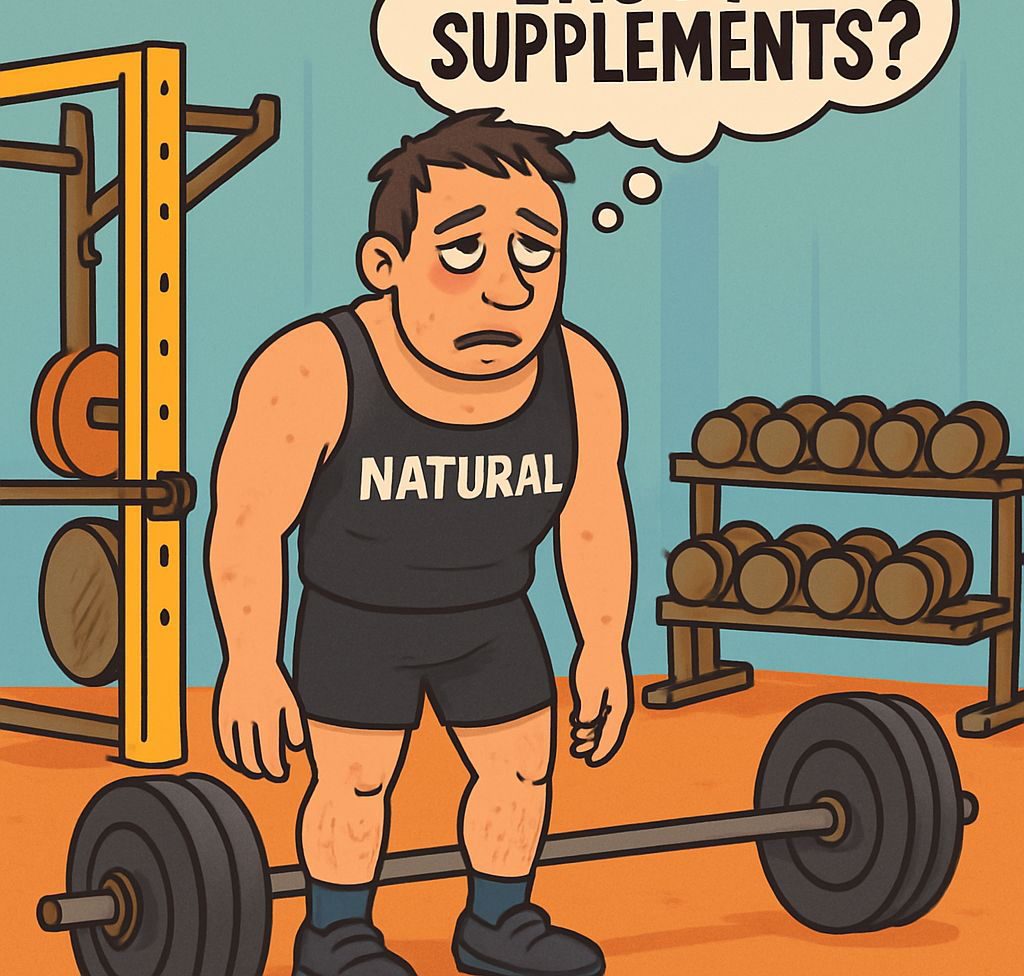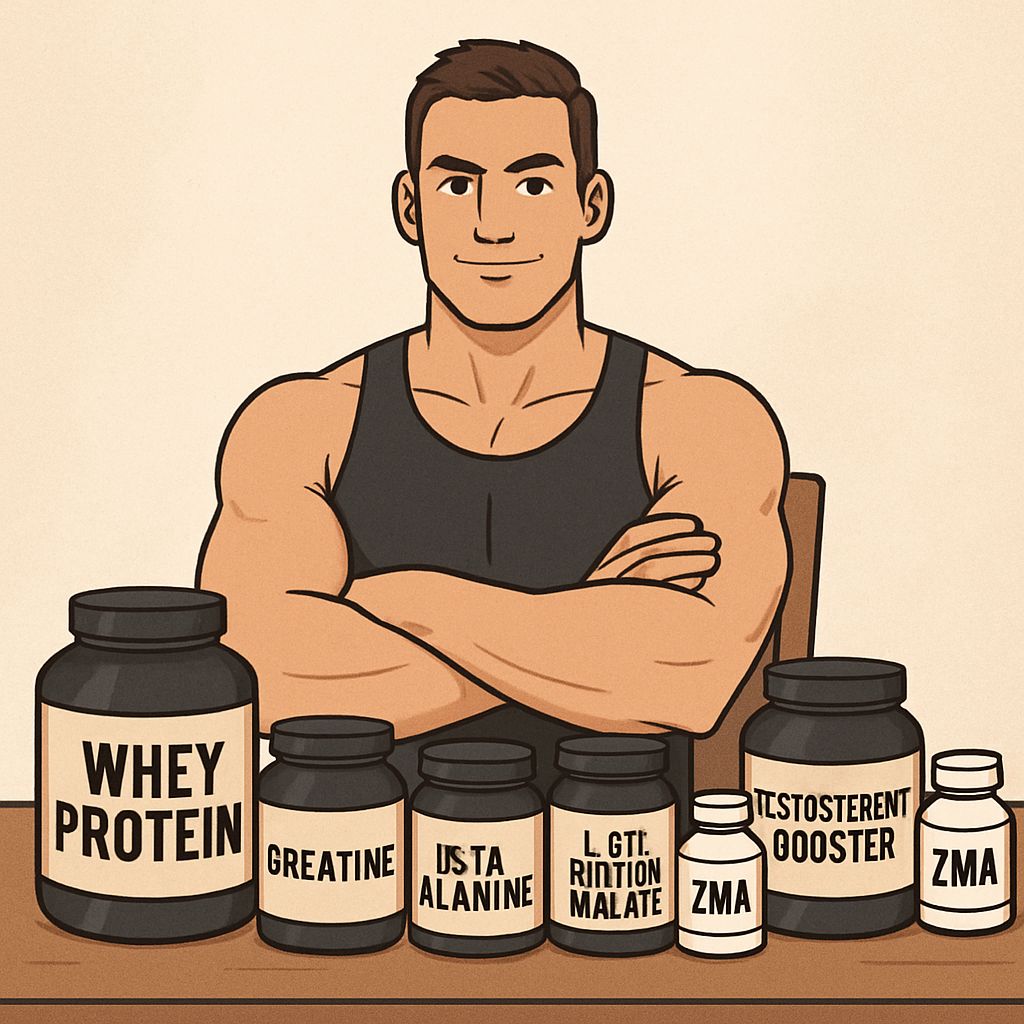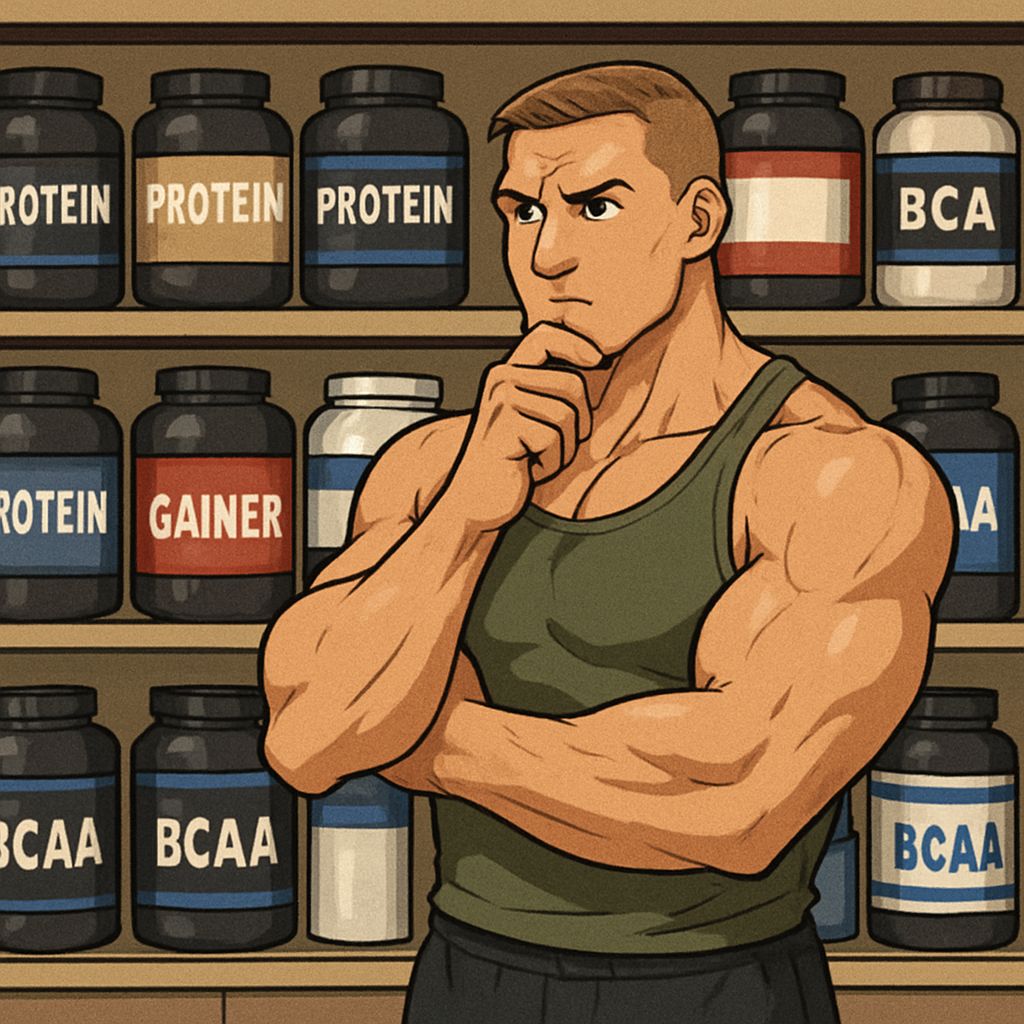Building muscle is a science that goes beyond lifting heavy weights. To grow muscle efficiently, you need to combine intense training, a high-protein diet, quality sleep, and strategic supplementation. In this blog, we’ll break down the best supplements for muscle growth, supported by real-life examples and expert insights from the world of fitness.
Why Supplements Matter in Bodybuilding
Before diving into the top muscle-building supplements, it’s important to understand their role.
Supplements Support, Not Replace Nutrition
Supplements are not magic pills. They exist to fill nutritional gaps and enhance performance and recovery. If your diet and training are poor, no supplement will help.
Real-life Example: Ravi, a 22-year-old student and gym-goer, was struggling to gain size despite eating well and training hard. He added whey protein and creatine to his regimen. Within 3 months, he noticed a visible change in muscle fullness and recovery speed.

Supplements for Muscle Growth
Supplements help support faster recovery, increased strength, and better performance when paired with proper training and nutrition. While they’re not a replacement for food or hard work, supplements like whey protein, creatine, and BCAAs can give you an edge in building lean muscle. Whey aids muscle repair, creatine boosts power, and BCAAs help reduce soreness. For overall health and recovery, omega-3s and multivitamins are also great additions. Choosing the right supplements can speed up your progress, especially if you’re consistent with workouts and sleep. Whether you’re just starting out or hitting a plateau, adding the right stack can make a big difference in your gains. Always go for trusted, clean-label products that are backed by science.
1. Whey Protein – The Foundation of Muscle Building
Why It’s Important
Whey protein is a fast-digesting complete protein rich in essential amino acids, especially leucine, which triggers muscle protein synthesis.
Best Time to Take:
- Post-workout (within 30 minutes)
- As a quick meal replacement
Types of Whey:
- Whey Concentrate – Affordable and effective
- Whey Isolate – Faster absorption, less lactose
- Hydrolyzed Whey – Pre-digested for rapid absorption
Expert Tip: Look for 20–25g of protein per scoop with minimal sugar and artificial additives.
Real-life Example: Kritika, a 26-year-old fitness coach, recommends whey to her clients post-training. One of her clients, Aman, gained 5 kg of lean mass in 4 months while using whey and tracking his macros.
2. Creatine Monohydrate – Power, Volume, and Strength
Why It Works
Creatine increases ATP (energy) in muscle cells, allowing you to lift heavier, recover faster, and train harder. It also draws water into muscles, making them look fuller.
Dosage:
- 5g daily (loading phase optional)
When to Take:
- Pre or post-workout with carbs for better absorption
Real-life Example: Arjun, a natural bodybuilder, has been using creatine consistently for 5 years. His bench press increased from 80 kg to 120 kg in two years of disciplined training and creatine usage.
Note: Creatine is safe for long-term use and does not harm kidneys in healthy individuals.
3. BCAAs (Branched-Chain Amino Acids) – Intra-Workout Support
What They Do
BCAAs (Leucine, Isoleucine, Valine) help reduce muscle soreness, prevent muscle breakdown, and improve endurance during workouts.
Ideal For:
- People trained fasted
- Intense cardio or long training sessions
Real-life Experience:
Neha, a CrossFit athlete, uses BCAAs during her fasted morning workouts. She reports faster recovery and reduced soreness post high-intensity circuits.
Expert Advice: If you already consume enough protein daily, BCAAs may not be essential. Focus on total protein intake.

4. Beta-Alanine – Delaying Muscle Fatigue
How It Helps
Beta-alanine increases carnosine in muscles, which buffers lactic acid buildup. This allows for longer training sessions and better endurance.
Dosage:
- 3–6g per day (can cause tingling sensation)
Best For:
- HIIT athletes
- Bodybuilders who do volume training (10+ reps)
Real-life Example: Suraj, a personal trainer, added beta-alanine to his routine before contest prep. It helped him maintain intensity during long supersets while cutting.
5. L-Citrulline Malate – Boosting Blood Flow and Pumps
Why It’s Popular
L-Citrulline increases nitric oxide production, improving blood flow to muscles. This enhances pumps, nutrient delivery, and endurance.
Dosage:
- 6–8g 30–45 mins before workout
Benefits:
- Bigger pumps
- Delayed fatigue
- Improved recovery
Gym Application: Pre-workouts often contain citrulline. If your pre-workout has less than 6g, consider adding pure citrulline malate.
Example: Tanmay, a men’s physique competitor, uses citrulline before every session for skin-splitting pumps that help with the muscle-mind connection.
6. Omega-3 Fish Oil – The Underrated Recovery King
Why It Matters
Omega-3s reduce inflammation, improve joint health, and enhance recovery. They also support heart and brain health.
Dosage:
- 1–3g of combined EPA and DHA per day
Real-life Example: Rakesh, 40, experienced chronic joint pain during leg days. After incorporating omega-3s daily, he noticed a significant reduction in joint
Expert Note: Look for high-potency formulas with at least 500mg EPA/DHA per serving.
7. Multivitamins and Vitamin D – Micronutrient Armor
Why They Matter
Deficiencies in key vitamins (like D, B12, and Magnesium) can negatively affect recovery, testosterone, and energy.
Who Needs It:
- Those with restrictive diets
- Vegetarians/vegans
- People with fatigue or slow recovery
Real-life Tip: Aakash, a 19-year-old ectomorph, wasn’t recovering well. Blood tests showed low vitamin D. After supplementing with D3, his strength and mood improved within weeks.
How to Choose the Right Supplements for Muscle Growth
Step-by-Step Guide:
- Fix your diet first – Eat enough calories and protein.
- Start with basics – Whey protein, creatine, multivitamin.
- Add based on needs – BCAAs, omega-3, beta-alanine for advanced goals.
- Buy from trusted brands – Look for 3rd party tested products (NSF, Informed Choice).

Final Thoughts
Supplements can enhance muscle growth, but only when paired with consistent training, solid nutrition, and proper recovery. Start with proven, science-backed options like whey protein and creatine, and add others based on your goals and body’s response.
Remember, even the best supplements won’t outwork a bad lifestyle. Train smart, eat right, rest well, and let supplements do their part.
Want a Personalized Stack of Supplements for Muscle Growth?
Drop a comment or contact us with your goals, and we’ll help build your custom supplement stack based on your body type and training style.
Conclusion: Choosing the Right Supplements for Muscle Growth
When it comes to muscle growth, there is no magic pill — but the right supplements can absolutely accelerate your progress when combined with consistent training, proper nutrition, and adequate recovery.
Each supplement mentioned — Whey Protein, Creatine Monohydrate, BCAAs, Pre-Workouts, Beta-Alanine, and Multivitamins — has scientific backing and real-life success stories behind it. They’re not meant to replace food or hard work, but to enhance your results.
Pro Tip: Choose trusted brands, avoid underdosed products, and always check labels. If you’re just starting out, begin with Whey Protein and Creatine, then expand based on your goals.
Whether you’re a beginner looking to gain your first 5 kg of lean mass or an intermediate lifter pushing for the next level, supplements — when used smartly — can be your secret weapon.




Just logged into taya888login and it’s pretty smooth sailing so far. Quick and easy login, and the games are running nicely. Giving it two thumbs up! Log in NOW at taya888login
Alright Hit Club fanatics, hitclubgamehitclub1.com looks like another portal to the game. Anyone playing through them? Worth checking out? hitclubgamehitclub1
74betcom is pretty simple, to the point. Easy to get around if you just wanna chill. Not over the top, just good fun. Stop by 74betcom!
Ubet95? Good selection, decent odds. Had a good experience overall, nothing to complain about! Give it a look yeah? Check out ubet95.
Yo, freecineapk seems pretty decent for watching movies on the go. The selection is alright, but hey, it’s free! A few buffering issues sometimes but overall, not a bad app. Download it here at freecineapk.